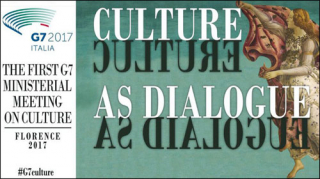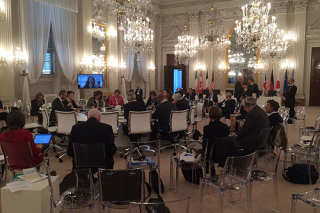On 30 March, Director-General Stefano De Caro addressed the G7 Culture meetings, held in the Sala Bianca of the Palazzo Pitti, in Florence, Italy. These were the first-ever such meetings, held on the initiative of Italy’s Culture Minister, Dario Franceschini.
The meetings saw high level delegations from the G7 industrialized nations and international organizations who met to exchange views on the importance of culture to foster stable societies and ensure diversity and dialogue. They also invoked the essential role of heritage protection in a world where culture is increasingly the target of attack, destruction and illicit profiteering by non-state parties.
The day began with a series of technical sessions featuring representatives of Member State institutions responsible for managing heritage along with the main international organizations. Three sessions discussed strengths, weaknesses and suggested practices in international legislation and regulations; heritage protection procedures in the fight against illicit traffic; and the role of cultural heritage in education modules and professional training.
“The G7 and European countries must take a leading role in updating the training field in cultural heritage,” declared De Caro in his statement on education and professional training for heritage. “I suggest we encourage more educational experience in transnational projects, especially in crisis areas and developing countries. I think of sub-Saharan Africa as a particular area of focus.”
Also attending the technical sessions were Paolo Giorgio Ferri, Special Advisor to ICCROM’s Director-General; Patricia Kell, Council Member of ICCROM and Director-General of the Canadian Conservation Institute (CCI); and Mounir Bouchenaki, former Director-General of ICCROM.
Speaking on the subject of illicit traffic, Dr Ferri mentioned the need to coordinate national legal protections and strengthen controls for export of heritage objects. He commented: “Illegal traffickers of heritage know where legislation is weak. They exploit those gaps in order to operate with impunity.”
Further to this vein, Dr Kell noted: “If any article has been illegally exported from the country of origin, then by definition it’s illegal to import it into Canada.” She called on more nations to adopt similar reciprocal legal restrictions, which would help in the fight against illicit traffic. In her view, greater harmonization of national frameworks and closer international cooperation between national customs services and law enforcement are needed.
“The heritage landscape has changed since the UNESCO conventions of 1954, 1970 and 1972,” observed Mounir Bouchenaki on the topic of international legislation and heritage protection. “Problems of heritage destruction, illegal excavation and illicit traffic, as in the case of Syria and Iraq, have now become a scourge, and the international community will have to deal with it.”
The afternoon saw a round table of culture ministers from the G7 nations and directors of two top international organizations. Dario Franceschini of Italy opened the session, which focused on the role of culture as a tool for dialogue between peoples. Statements were heard by Mélanie Joly of Canada, Audrey Azoulay of France, Bruce Wharton of the United States, Tibor Navracsics of the European Union, Irina Bokova of UNESCO, Karen Bradley of the United Kingdom, Maria Böhmer of Germany, and Ryohei Miyata of Japan.
The statements were synthesized into the Florence Document which was signed by all culture ministers present.
The ministers stressed the importance of last week’s unanimous UN Security Council resolution 2347 which condemns the destruction and smuggling of cultural heritage during armed conflict, including by non-state actors, and affirms that such attacks might constitute a war crime and must be brought to justice. Sponsored by France and Italy, this resolution places culture on the United Nations agenda at the highest level. It supports an active cultural diplomacy between all UN Member States and encourages cooperation to protect their cultural heritage through a range of available tools, including harmonization and mutual enforcement of import and export regulations, documentation, and the use of safe havens. The resolution has been applauded as a strong call of encouragement to the worldwide heritage sector, and a vital tool in galvanizing cooperation and spreading awareness on this issue crucial to the maintenance of stable and diverse societies.
At the closure of these first-ever G7 culture meetings, Dario Franceschini again evoked the importance of heritage as a tool for dialogue, and the essential role of cultural diplomacy.
“Italy wants to build bridges, not walls,” Franceschini tweeted on 31 March.
Secondo giorno del #G7Culture: un dialogo tra i responsabili di 7 grandi istituzioni culturali. L'Italia vuole costruire ponti, non muri. pic.twitter.com/zyfLkiNjTF
— Dario Franceschini (@dariofrance) 31 March 2017
On UN Resolution 2347
- UN: Security Council Condemns Destruction, Smuggling of Cultural Heritage by Terrorist Groups
- UNESCO: UN Security Council adopts historic resolution for the protection of heritage
- UN adopts resolution to protect cultural heritage
- UN Moves to Stop Terrorist Financing — But More Action Needed Call to protect heritage sites
- Destroying Heritage
- UAE co-sponsors UN Security Council Resolution No 2347 on protection of cultural heritage in event of armed conflict
- ‘War crimes': UN strengthens resolve against destruction of cultural heritage
- China urges int’l cooperation to better protect cultural heritage in conflict areas
- Building peace requires culture, education – message of historic UN Security Council resolution


